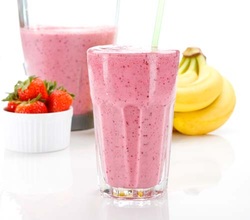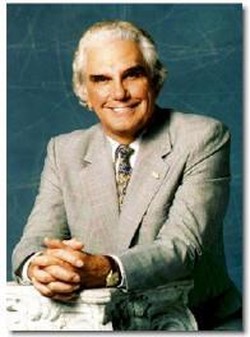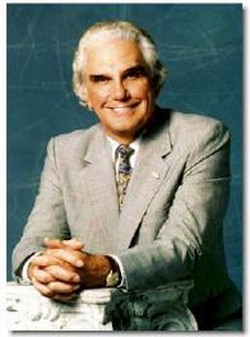
Mornings are tedious, among many things. Waking up, making the transition from your warm bed to the frigid conditions of Canadian winter. Everyday is a routine, one which many, if not all of us, would love to see change for the better. Morning motivation is hard to come by, and all (at one point or another) have encountered the dreaded "morning syndrome". Morning syndrome, you may ask? I've provided a list of symptoms one may experience to heighten your understanding of this early hour pandemic:
- Inability to stay awake
- Bad mood
- Sever lack of energy
Seem familiar to you? If so, why does this occur and more importantly, how can it be fixed? How can you wake up feeling instantly revived and alert? How can you achieve that essential dose of energy needed to face the day with confidence and optimism? As always... IT'S SIMPLE!
Society is brimming with seemingly quick and "easy" fast-food options to start off your day. As a consumer, the idea of grabbing the 3.99 drive-thru breakfast special can undoubtedly seem appealing. But to what cost? Easy on the wallet and easily incorporated into a tight schedule, yet by no means easy on what's most important... You're health. From bagels to bulges, oatmeal to obesity, the list goes on. Fast and efficient is not quick, but opting with this route will certainly shorten your life at quite a pace. These fried morning favourites carry quite the caloric punch, and in no way contribute to a well-balanced diet, physical, or emotional wellness in any way shape or form. Yes, I know what you're thinking, But Brett, what does this useless rant mean to me? What DOES it mean to you? For starters, such habits are the sole cause of your morning deficiency, but there is good news. Changing these patterns is easy, and indescribably better for your body as a functioning system. This is the How-To toward turning that frown upside down and waking up ready to face the world ahead.
1) Eat clean, wholesome meals
I'm not here to sound like your mother back in the day, but I am a firm believer in eating clean, and breakfast is of no exception. In fact, the majority of one's daily caloric intake should be ingested in the first meal of the day. I know this reality can be a hard pill to swallow, as many have a difficult time either making the time to prepare a healthy jump-start to the day, or even more commonly, fail to possess any appetite whatsoever. As for the time constraints, we will re-address that in just a bit. For now, let's focus on what should be eaten, shall we?
Regardless of what any restaurant or frozen box may advertise, the "healthy option" on any fast-food or pre-packaged menu is nothing of the sort. One's first priority should always be to cook at home. Buying groceries for the coming week's meals may seem overly pricey at first, but keep hold of your McDonald's receipts for that same allotted time and I promise you'll be surprised just how similar the two really are. What you put into your body reflects what you're going to get out of it. Every proper breakfast should contain most of your daily carbohydrate requirement; this way, your body has all day to break it down and convert it to energy. A list of guilt-free complex carb-loaded options include:
- 1-2 slices multigrain toast (flax and gluten free are also tasty and acceptable) with peanut butter (natural peanut butter or almond butter are preferred)
- Spelt cereals with no added sugar (stay away from the sugary cereals made with white wheat)
- Stoned oats with berries (not the 2 minute Quaker box)
- Berries (blueberries, blackberries, raspberries) contain many antioxidants and provide a healthy serving of carbs per 1 cup serving
Yeah sure, problem solved, right? No, morning meals don't stop there, amigo, as carbs should always be accompanied by a healthy serving of protein to prevent muscle depletion as you continue to burn energy throughout the day. Carbs provide us with that vital energy boost, but can often leave us feeling hungry a mere hour later. This is where protein comes in, as this nutrient is used to keep that belly full and firm. Cutting up a chicken breast or reheating last night's salmon are both great options for those who are lacking in the time department. However, if possible, foods such as 2-3 eggs (substitute egg whites for those trying to lose weight) can be eaten as is or as an omelette with veggies and a touch of olive oil. Greek yogurt has also proven itself to be a great (and quick) source of protein. With roughly 17 grams per 175 gram serving (or as my labels read), plain greek yogurt is low in sugar and is also probiotic, contributing to a strong immune system. When mixed with the berries listed above and topped with a tablespoon or two or natural granola, this alternative will have you coming back to the fridge every morning. My personal favourite route is the protein shake. Choosing the flavour is dependent on your preferences, just make sure no maple syrup or chocolate sauce "accidentally" fall into the blender. Adding ingredients such as berries (or a banana), spinach, yogurt, whey protein (if you have it), almond milk (less carbs/more mono-saturates than regular milk) and even a tablespoon of peanut butter will hit the spot and taste great! Last, it is absolutely essential that one consumes a large amount of water throughout the day, mornings especially. Your body loses water while you sleep, and is not only in starvation mode when it awakens, but also in dire need of hydration.
- Inability to stay awake
- Bad mood
- Sever lack of energy
Seem familiar to you? If so, why does this occur and more importantly, how can it be fixed? How can you wake up feeling instantly revived and alert? How can you achieve that essential dose of energy needed to face the day with confidence and optimism? As always... IT'S SIMPLE!
Society is brimming with seemingly quick and "easy" fast-food options to start off your day. As a consumer, the idea of grabbing the 3.99 drive-thru breakfast special can undoubtedly seem appealing. But to what cost? Easy on the wallet and easily incorporated into a tight schedule, yet by no means easy on what's most important... You're health. From bagels to bulges, oatmeal to obesity, the list goes on. Fast and efficient is not quick, but opting with this route will certainly shorten your life at quite a pace. These fried morning favourites carry quite the caloric punch, and in no way contribute to a well-balanced diet, physical, or emotional wellness in any way shape or form. Yes, I know what you're thinking, But Brett, what does this useless rant mean to me? What DOES it mean to you? For starters, such habits are the sole cause of your morning deficiency, but there is good news. Changing these patterns is easy, and indescribably better for your body as a functioning system. This is the How-To toward turning that frown upside down and waking up ready to face the world ahead.
1) Eat clean, wholesome meals
I'm not here to sound like your mother back in the day, but I am a firm believer in eating clean, and breakfast is of no exception. In fact, the majority of one's daily caloric intake should be ingested in the first meal of the day. I know this reality can be a hard pill to swallow, as many have a difficult time either making the time to prepare a healthy jump-start to the day, or even more commonly, fail to possess any appetite whatsoever. As for the time constraints, we will re-address that in just a bit. For now, let's focus on what should be eaten, shall we?
Regardless of what any restaurant or frozen box may advertise, the "healthy option" on any fast-food or pre-packaged menu is nothing of the sort. One's first priority should always be to cook at home. Buying groceries for the coming week's meals may seem overly pricey at first, but keep hold of your McDonald's receipts for that same allotted time and I promise you'll be surprised just how similar the two really are. What you put into your body reflects what you're going to get out of it. Every proper breakfast should contain most of your daily carbohydrate requirement; this way, your body has all day to break it down and convert it to energy. A list of guilt-free complex carb-loaded options include:
- 1-2 slices multigrain toast (flax and gluten free are also tasty and acceptable) with peanut butter (natural peanut butter or almond butter are preferred)
- Spelt cereals with no added sugar (stay away from the sugary cereals made with white wheat)
- Stoned oats with berries (not the 2 minute Quaker box)
- Berries (blueberries, blackberries, raspberries) contain many antioxidants and provide a healthy serving of carbs per 1 cup serving
Yeah sure, problem solved, right? No, morning meals don't stop there, amigo, as carbs should always be accompanied by a healthy serving of protein to prevent muscle depletion as you continue to burn energy throughout the day. Carbs provide us with that vital energy boost, but can often leave us feeling hungry a mere hour later. This is where protein comes in, as this nutrient is used to keep that belly full and firm. Cutting up a chicken breast or reheating last night's salmon are both great options for those who are lacking in the time department. However, if possible, foods such as 2-3 eggs (substitute egg whites for those trying to lose weight) can be eaten as is or as an omelette with veggies and a touch of olive oil. Greek yogurt has also proven itself to be a great (and quick) source of protein. With roughly 17 grams per 175 gram serving (or as my labels read), plain greek yogurt is low in sugar and is also probiotic, contributing to a strong immune system. When mixed with the berries listed above and topped with a tablespoon or two or natural granola, this alternative will have you coming back to the fridge every morning. My personal favourite route is the protein shake. Choosing the flavour is dependent on your preferences, just make sure no maple syrup or chocolate sauce "accidentally" fall into the blender. Adding ingredients such as berries (or a banana), spinach, yogurt, whey protein (if you have it), almond milk (less carbs/more mono-saturates than regular milk) and even a tablespoon of peanut butter will hit the spot and taste great! Last, it is absolutely essential that one consumes a large amount of water throughout the day, mornings especially. Your body loses water while you sleep, and is not only in starvation mode when it awakens, but also in dire need of hydration.
Now, here you are, thinking to yourself, This is all great, but where do I find the time to make all this while throwing on my monkey suit and dressing the kids? Easy! Prepping meals the night before, or even on a sunday night prior to the start of the week, will cut your time in the kitchen in half. I don't mean go and pour a bowl of spelt cereal and leave it in the fridge, or spread almond butter on 12 pieces of toast and wrap them up. No, by no means whatsoever. Pre-week prep can consist of cutting up and bagging a week's-worth of veggies. This will help those of you opting for the omelette, as this way, all your ingredients are pre-chopped and ready to be thrown in the pan the morning of.
2) Sleep is Essential
We all struggle with the concept, but truth is, sleep is equally, if not more important to restoring your body's energy levels for the following day. Never rely on the late hours of the night to finish off papers or executive work. By sleeping for less than a minimum of six hours per night, you are hindering your body's ability to perform to its fullest potential, depriving it of the rest it needs to fire on all cylinders. By sleeping longer and eating right, you'll soon start to notice that waking up no longer even requires that Godforsaken large coffee to open your eyes. Coffee will give you the midday crash, while sticking to proper eating and sleep will have you alert from dusk to dawn.
Well, two easy tips that I know have helped me considerably. Remember, fast is fattening and homemade is healthy! Take the time to benefit yourself by munching down on the right foods to start off your day, not that 3.99 special. Carpe diem everybody, and




 RSS Feed
RSS Feed